| Listing 1 - 10 of 11 | << page >> |
Sort by
|
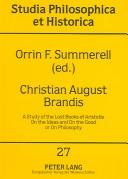
ISBN: 3631514875 Year: 2005 Volume: 27 Publisher: Frankfurt am Main ; Bruxelles ; New York Peter Lang
Abstract | Keywords | Export | Availability | Bookmark
 Loading...
Loading...Choose an application
- Reference Manager
- EndNote
- RefWorks (Direct export to RefWorks)
Ancient ethics --- Antieke ethiek --- Ethics [Ancient ] --- Ethiek [Antieke ] --- Ethiek van de Oudheid --- Ethique de l'Antiquité --- Idea (Philosophy) --- Ideas (Philosophy) --- Ideas [Theory of ] --- Idee (Filosofie) --- Ideeën (Filosofie) --- Ideeënleer --- Idée (Philosophie) --- Idées (Philosophie) --- Idées [Theorie des ] --- Ethics, Ancient --- Plato --- Ideas, Theory of --- Theory of ideas --- Aristotle. --- Knowledge, Theory of --- Philosophy --- Memetics
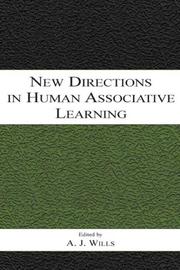
ISBN: 1135609659 1282375091 9786612375095 1410612112 9781410612113 9780805850819 0805850813 0805850813 9781135609658 9781135609603 1135609608 9781135609641 1135609640 9780415650434 0415650437 Year: 2005 Publisher: Mahwah, N.J. : Lawrence Erlbaum,
Abstract | Keywords | Export | Availability | Bookmark
 Loading...
Loading...Choose an application
- Reference Manager
- EndNote
- RefWorks (Direct export to RefWorks)
The editor and authors of this book present a synthesis of work on human associative learning, tracing some of its historical roots but concentrating mainly on recent developments. It is divided into three sections: an introduction to the recent data and controversies in the study of human associative learning; recent developments in the formal theories of how associative learning occurs; and applied work on human associative learning, particularly its application to depression and to the development of preferences. The book is designed to be accessible to undergraduates, providing a clear ill
Paired-association learning --- Associative learning --- Paired associate learning --- Paired associates --- Association of ideas --- Learning, Psychology of
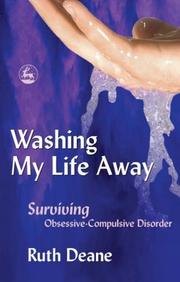
ISBN: 1280261994 9786610261994 1846420970 9781846420979 9781843103332 1843103338 9781280261992 6610261997 Year: 2005 Publisher: London Philadelphia Jessica Kingsley Publishers
Abstract | Keywords | Export | Availability | Bookmark
 Loading...
Loading...Choose an application
- Reference Manager
- EndNote
- RefWorks (Direct export to RefWorks)
OCD affects one in fifty people and one of them was Ruth Deane. In this frank and personal account she shares her own experience as an OCD sufferer, taking the reader on a moving, honest and at times light-hearted journey, from washing her hands until they cracked and bled, to hospital admission and eventual management and recovery from OCD.
Obsessive-compulsive disorder --- Obsessive-compulsive disorder. --- Compulsive disorder --- Fixed ideas --- Obsession (Psychology) --- Obsessive-compulsive neuroses --- Obsessive-compulsive neurosis --- OCD (Disease) --- Neuroses --- Compulsive behavior --- Patients --- Deane, Ruth, --- Mental health.
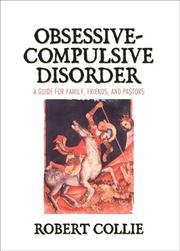
ISBN: 078902537X 1317825160 1315821206 1317825179 9781317825173 1306576555 9781306576550 9781315821207 0789025361 9780789025364 9780789025371 9781317825159 9781317825166 Year: 2005 Publisher: New York Haworth Pastoral Press
Abstract | Keywords | Export | Availability | Bookmark
 Loading...
Loading...Choose an application
- Reference Manager
- EndNote
- RefWorks (Direct export to RefWorks)
Examine the fourth largest mental health problem in America?OCD?and how YOU can help!Since obsessive-compulsive disorder affects 2.5% of the world population, someone you know is likely to have this disorder. Obsessive-Compulsive Disorder: A Guide for Family, Friends, and Pastors is a handy ?physician's assistant? that not only provides a fresh overview of OCD but also focuses on the issue of scrupulosity?obsessive-compulsive anxiety over scruples in self and others?as a religious issue. Written by a pastoral counselor who is also a clinical social worker, this book will help you g
Obsessive-compulsive disorder --- Compulsive disorder --- Fixed ideas --- Obsession (Psychology) --- Obsessive-compulsive neuroses --- Obsessive-compulsive neurosis --- OCD (Disease) --- Neuroses --- Compulsive behavior --- Patients --- Pastoral counseling of. --- Religious life.
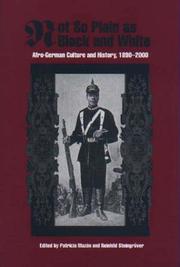
ISBN: 1580461832 1580463347 9786612080562 1282080563 1580466788 Year: 2005 Volume: 19 Publisher: Rochester, NY : University of Rochester Press,
Abstract | Keywords | Export | Availability | Bookmark
 Loading...
Loading...Choose an application
- Reference Manager
- EndNote
- RefWorks (Direct export to RefWorks)
Since the Middle Ages, Africans have lived in Germany as slaves and scholars, guest workers and refugees. After Germany became a unified nation in 1871, it acquired several African colonies but lost them after World War I. Children born of German mothers and African fathers during the French occupation of Germany were persecuted by the Nazis. After World War II, many children were born to African American GIs stationed in Germany and German mothers. Today there are 500,000 Afro-Germans in Germany out of a population of 80 million. Nevertheless, German society still sees them as "foreigners," assuming they are either African or African American but never German.
In recent years, the subject of Afro-Germans has captured the interest of scholars across the humanities for several reasons. Looking at Afro-Germans allows us to see another dimension of the nineteenth- and early twentieth-century ideas of race that led to the Holocaust. Furthermore, the experience of Afro-Germans provides insight into contemporary Germany's transformation, willing or not, into a multicultural society. The volume breaks new ground not only by addressing the topic of Afro-Germans but also by combining scholars from many disciplines.
Patricia Mazon is Associate Professor in the Department of History at the State University of New York at Buffalo.
Reinhild Steingrover is Assistant Professor in the Department of Humanities at the Eastman School of Music at the University of Rochester.
Blacks --- Race identity --- History. --- Germany --- Race relations. --- History --- Race relations --- Black people --- Ethnology --- Black persons --- Negroes --- African American GIs. --- African Colonies. --- Afro-German Experience. --- Afro-Germans. --- Contemporary Germany. --- Cultural Transformation. --- German Society. --- Holocaust. --- Multicultural Society. --- Nazi Persecution. --- Patricia Mazon. --- Race Ideas. --- Racial Ideas. --- Racism. --- Reinhild Steingrover. --- World War II.
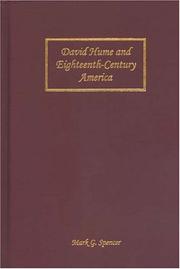
ISBN: 1580461182 1580463444 9786611741242 1281741248 1580466338 9781580466332 Year: 2005 Publisher: Rochester, N.Y. University of Rochester Press
Abstract | Keywords | Export | Availability | Bookmark
 Loading...
Loading...Choose an application
- Reference Manager
- EndNote
- RefWorks (Direct export to RefWorks)
A thorough examination of the role which David Hume's writings played upon the founders of the United States. This book explores the reception of David Hume's political thought in eighteenth-century America. It presents a challenge to standard interpretations that assume Hume's thought had little influence in early America. Eighteenth-century Americans are often supposed to have ignored Hume's philosophical writings and to have rejected entirely Hume's 'Tory' 'History of England'. James Madison, if he used Hume's ideas in 'Federalist' No. 10, it is commonly argued, thought best to do so silently-open allegiance to Hume was a liability. Despite renewed debate about the impact of Hume's political ideas in America, existing scholarship is often narrow and highly speculative. Were Hume's works available in eighteenth-century America? If so, which works? Where? When? Who read Hume? To what avail? To answer questions of that sort, this books draws upon a wide assortment of evidence. Early American book catalogues, periodical publications, and the writings of lesser-light thinkers are used to describe Hume's impact on the social history of ideas, an essential context for understanding Hume's influence on many of the classic texts of early American political thought. Hume's 'Essays and Treatises on Several Subjects', was readily available, earlier, and more widely, than scholars have supposed. The 'History of England' was read most frequently of all, however, and often in distinctive ways. Hume's 'History', which presented the British constitution as a patch-work product of chance historical developments, informed the origins of the American Revolution and Hume's subsequent reception through the late eighteenth century. The 326 subscribers to the first American edition of Hume's 'History' (published in Philadelphia in 1795/96) are more representative of the 'History's' friendly reception in enlightened America than are its few critics. Thomas Jefferson's latter-day rejection of Hume's political thought foreshadowed Hume's falling reputation in nineteenth-century America.MARK G. SPENCER is associate professor of history at Brock University where he holds a Chancellor's Chair for Research Excellence. His books include Hume's Reception in Early America (2002), Utilitarians and Their Critics in America, 1789-1914 (2005), and Ulster Presbyterians in the Atlantic World (2006).
Hume, David --- Political science --- History --- Hume, David, --- America. --- American Revolution. --- David Hume. --- Early America. --- Early American Political Thought. --- Eighteenth Century. --- Enlightenment. --- Impact of Hume's Works. --- Influence. --- Mark G. Spencer. --- Political Ideas. --- Political Thought.
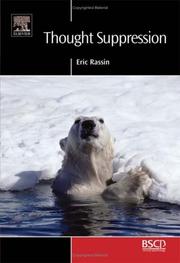
ISBN: 1280632992 9786610632992 0080461182 0080447147 9780080447148 9780080461182 Year: 2005 Publisher: Amsterdam Boston Elsevier
Abstract | Keywords | Export | Availability | Bookmark
 Loading...
Loading...Choose an application
- Reference Manager
- EndNote
- RefWorks (Direct export to RefWorks)
Is it possible to ban unwanted thoughts from consciousness? According to the literature on thought suppression, the answer is no. In the 1980's, Wegner and colleges demonstrated that the average person cannot prevent a trivial thought like that of a polar bear from entering consciousness approximately seven times in a five minute period. This experimental finding was followed by a substantial number of replications. This book provides an up-to-date overview of the thought suppression literature. First, similarities and differences between suppression, repression, and dissociation are discussed.
Thought and thinking. --- Obsessive-compulsive disorder. --- Compulsive disorder --- Fixed ideas --- Obsession (Psychology) --- Obsessive-compulsive neuroses --- Obsessive-compulsive neurosis --- OCD (Disease) --- Mind --- Thinking --- Thoughts --- Neuroses --- Compulsive behavior --- Educational psychology --- Philosophy --- Psychology --- Intellect --- Logic --- Perception --- Psycholinguistics --- Self --- Thought and thinking --- Obsessive-compulsive disorder
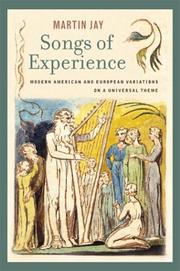
ISBN: 1282358510 9786612358517 0520939794 1597349054 9780520939790 9780520242722 0520242726 9781597349055 9781282358515 9781417584970 1417584971 Year: 2005 Publisher: Berkeley University of California Press
Abstract | Keywords | Export | Availability | Bookmark
 Loading...
Loading...Choose an application
- Reference Manager
- EndNote
- RefWorks (Direct export to RefWorks)
Few words in both everyday parlance and theoretical discourse have been as rhapsodically defended or as fervently resisted as "experience." Yet, to date, there have been no comprehensive studies of how the concept of experience has evolved over time and why so many thinkers in so many different traditions have been compelled to understand it. Songs of Experience is a remarkable history of Western ideas about the nature of human experience written by one of our best-known intellectual historians. With its sweeping historical reach and lucid comparative analysis-qualities that have made Martin Jay's previous books so distinctive and so successful-Songs of Experience explores Western discourse from the sixteenth century to the present, asking why the concept of experience has been such a magnet for controversy. Resisting any single overarching narrative, Jay discovers themes and patterns that transcend individuals and particular schools of thought and illuminate the entire spectrum of intellectual history. As he explores the manifold contexts for understanding experience-epistemological, religious, aesthetic, political, and historical-Jay engages an exceptionally broad range of European and American traditions and thinkers from the American pragmatists and British Marxist humanists to the Frankfurt School and the French poststructuralists, and he delves into the thought of individual philosophers as well, including Montaigne, Bacon, Locke, Hume and Kant, Oakeshott, Collingwood, and Ankersmit. Provocative, engaging, erudite, this key work will be an essential source for anyone who joins the ongoing debate about the material, linguistic, cultural, and theoretical meaning of "experience" in modern cultures.
Experience. --- History --- History, Modern --- Knowledge, Theory of --- Philosophy --- Psychology --- Reality --- Pragmatism --- Philosophy. --- aesthetics. --- america. --- american tradition. --- comparative analysis. --- concept of experience. --- epistemological. --- europe. --- european tradition. --- experience. --- historical perspective. --- history of ideas. --- human experience. --- intellectual historians. --- linguistics. --- marxist humanists. --- modern culture. --- modern philosophy. --- nonfiction. --- philosophers. --- political perspective. --- poststructuralists. --- power of experience. --- religious experiences. --- theoretical perspective. --- universal themes. --- western thought.
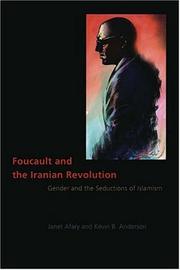
ISBN: 1282678930 9786612678936 0226007871 9780226007878 9780226007854 0226007855 9780226007861 0226007863 0226007855 0226007863 9781282678934 6612678933 Year: 2005 Publisher: Chicago University of Chicago Press
Abstract | Keywords | Export | Availability | Bookmark
 Loading...
Loading...Choose an application
- Reference Manager
- EndNote
- RefWorks (Direct export to RefWorks)
In 1978, as the protests against the Shah of Iran reached their zenith, philosopher Michel Foucault was working as a special correspondent for Corriere della Sera and le Nouvel Observateur. During his little-known stint as a journalist, Foucault traveled to Iran, met with leaders like Ayatollah Khomeini, and wrote a series of articles on the revolution. Foucault and the Iranian Revolution is the first book-length analysis of these essays on Iran, the majority of which have never before appeared in English. Accompanying the analysis are annotated translations of the Iran writings in their entirety and the at times blistering responses from such contemporaneous critics as Middle East scholar Maxime Rodinson as well as comments on the revolution by feminist philosopher Simone de Beauvoir. In this important and controversial account, Janet Afary and Kevin B. Anderson illuminate Foucault's support of the Islamist movement. They also show how Foucault's experiences in Iran contributed to a turning point in his thought, influencing his ideas on the Enlightenment, homosexuality, and his search for political spirituality. Foucault and the Iranian Revolution informs current discussion on the divisions that have reemerged among Western intellectuals over the response to radical Islamism after September 11. Foucault's provocative writings are thus essential for understanding the history and the future of the West's relationship with Iran and, more generally, to political Islam. In their examination of these journalistic pieces, Afary and Anderson offer a surprising glimpse into the mind of a celebrated thinker.
History. --- Philosophy. --- Foucault, Michel, --- Political and social views. --- Iran --- History --- iran, iranian revolution, gender, islam, islamism, muslim, religious, religion, history, womens studies, political science, sociology, michel foucault, corriere della sera, le nouvel observateu, journalism, journalist, translated works, translation, middle east, simone de beauvoir, philosophy, enlightenment, homosexuality, sexuality, sex, social thought, historian of ideas, literary criticism, power, knowledge, control, societal institutions.
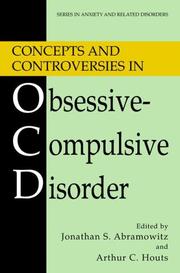
ISBN: 128070084X 9786610700844 0387233709 038723280X 1441920080 Year: 2005 Publisher: New York, N.Y. ; [London] : Springer,
Abstract | Keywords | Export | Availability | Bookmark
 Loading...
Loading...Choose an application
- Reference Manager
- EndNote
- RefWorks (Direct export to RefWorks)
Few syndromes in psychopathology generate as much popular curiosity and clinical exploration as does obsessive-compulsive disorder (OCD). Since the 1970s, research on OCD has increased exponentially. Speci?c advances include an improved grasp of the heterogeneity of the disorder, identi?cation of putative subtyping schemes, and the development of increasingly sophisticated theoretical models of the etiology and maintenance. Perhaps most importantly, research has led to advances in treatment; andwhereasthe?rstlinetherapies(cognitive-behaviortherapyandserotonergicm- ication) are not entirely effective for every sufferer, they have transformed OCD from an unmanageable lifetime af?iction into a treatable problem that need not reduce quality of life. Despite the aforementioned advances, there have emerged a number of sharp disagreements concerning OCD. Differences have surfaced over phenomenological issues, etiological models, and approaches to treatment, and often occur (but not exclusively) along disciplinary lines between biologically oriented and cogniti- behaviorally oriented authorities. For example, medical approaches posit that abn- mal biological processes cause OCD, whereas psychosocial formulations emphasize the role of learning and dysfunctional cognitions. Yet because theoretical conjecture andempirical?ndingsfromwithineachtraditionaretypicallyaddressedtowardd- tinct and narrow audiences, clinicians, researchers, and students with broad interests are hindered from gaining a clear grasp of the diverse (and sometimes polarized) perspectives.
Obsessive-compulsive disorder. --- Compulsive behavior. --- Addictive behavior --- Behavior, Compulsive --- Compulsion (Psychology) --- Impulse --- Psychology, Pathological --- Obsessive-compulsive disorder --- Compulsive disorder --- Fixed ideas --- Obsession (Psychology) --- Obsessive-compulsive neuroses --- Obsessive-compulsive neurosis --- OCD (Disease) --- Neuroses --- Compulsive behavior --- Psychology, clinical. --- Consciousness. --- Clinical Psychology. --- Personality and Social Psychology. --- Clinical psychology. --- Apperception --- Mind and body --- Perception --- Philosophy --- Psychology --- Spirit --- Self --- Psychiatry --- Psychology, Applied --- Psychological tests --- Personality. --- Social psychology. --- Mass psychology --- Psychology, Social --- Human ecology --- Social groups --- Sociology --- Personal identity --- Personality psychology --- Personality theory --- Personality traits --- Personology --- Traits, Personality --- Individuality --- Persons --- Temperament
| Listing 1 - 10 of 11 | << page >> |
Sort by
|

 Search
Search Feedback
Feedback About UniCat
About UniCat  Help
Help News
News